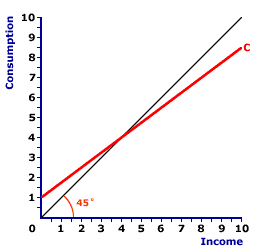
|
|
KALDOR-HICKS EFFICIENCY: A type of efficiency that results if the monetary value of society's resources are maximized. This is achieved if the marginal willingness to pay by those who benefit from an action is equal to the marginal willingness to accept of those harmed. If this condition is not achieved, then a Kaldor-Hicks improvement is possible. Kaldor-Hicks efficiency, named after Nicholas Kaldor and John Hicks, is the theoretical basis of benefit-cost analysis, a technique commonly used to evaluate the desirability of producing public goods (such as parks, highways, or reservoirs). This is one of two noted efficiency criteria used in economics. The other is Pareto efficiency.
Visit the GLOSS*arama
|
|


|

|
                           INTERCEPT, CONSUMPTION LINE: The intercept of the consumption line indicates autonomous consumption, consumption that does not depend on the level of income or production. This can be thought of as the baseline level of consumption that would be undertaken if income falls to zero. Autonomous consumption is affected by the consumption expenditures determinants, which cause a change in the intercept and a shift of the consumption line. The value of the intercept of the saving line is the negative of the value of the intercept of the saving line. | Consumption Line | 
|
The consumption line, also termed propensity-to-consume line or consumption function, shows the relation between consumption expenditures and income for the household sector. The income measure commonly used is national income or disposable income. Occasionally a measure of aggregate production, such as gross domestic product, is used instead.A representative consumption line is presented in the exhibit to the right. This red line, labeled C in the exhibit, is positively sloped, indicating that greater levels of income generate greater consumption expenditures by the household sector. This positive relation corresponds to the fundamental psychological law of Keynesian economics. The consumption line graphically illustrates the consumption-income relation for the household sector, which is the foundation of the aggregate expenditures line used in Keynesian economics to identify equilibrium income and production. For reference, a black 45-degree line is also presented in this exhibit. Because this line has a slope of one, it indicates the relative slope of the consumption line. The intercept of the consumption line indicates the intersection point between the consumption line and the vertical consumption axis. The consumption line intersects the vertical axis at a value of $1 trillion. Theoretically, this is a minimum "baseline" level of consumption, the amount of consumption undertaken even if income falls to zero. More to the point, this intersection indicates autonomous consumption--consumption expenditures unrelated to income. Click the [Intercept] button to illustrate. Autonomous consumption is consumption expenditures by the household sector that are unrelated to and unaffected by the level of income or production. This is best indicated by a zero level of income. While individuals occasionally come face-to-face with autonomous consumption, as their incomes drop to zero due to unemployment, for the aggregate economy autonomous consumption is mostly an unlikely theoretical extrapolation. However, from an analytical perspective, the intercept of the consumption line is affected by the consumption expenditures determinants. These are ceteris paribus factors other than income that affect consumption, but which are held constant when the consumption line is constructed. Any change in these determinants cause the consumption line to shift, which necessarily means a new intercept and a new level of autonomous consumption.

Recommended Citation:INTERCEPT, CONSUMPTION LINE, AmosWEB Encyclonomic WEB*pedia, http://www.AmosWEB.com, AmosWEB LLC, 2000-2024. [Accessed: July 26, 2024].
Check Out These Related Terms... | | | | | | | | | | | | | | |
Or For A Little Background... | | | | | | | | | |
And For Further Study... | | | | | | | | | | | | | | |
Search Again?
Back to the WEB*pedia
|



|

|
GRAY SKITTERY
[What's This?]
Today, you are likely to spend a great deal of time flipping through mail order catalogs looking to buy either a genuine down-filled comforter or a 200-foot blue garden hose. Be on the lookout for high interest rates.
Your Complete Scope
This isn't me! What am I?
|

|
|
A half gallon milk jug holds about $50 in pennies.
|

|
|
"Old age isn't so bad when you consider the alternative. " -- Cato, Roman orator
|

|
ICSID
International Center for the Settlement of Investment Disputes
|

|
|
Tell us what you think about AmosWEB. Like what you see? Have suggestions for improvements? Let us know. Click the User Feedback link.
User Feedback
|


|


